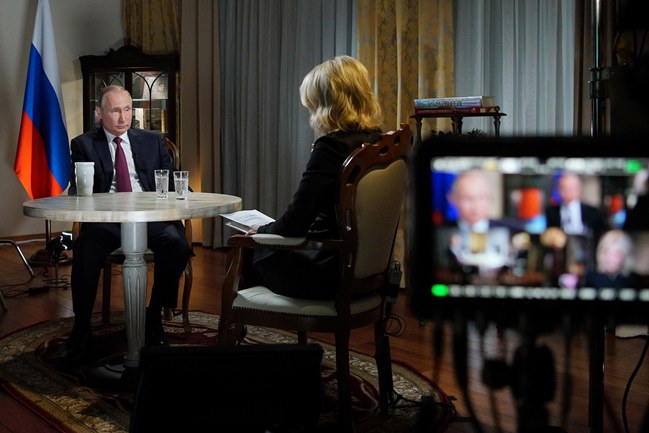Vladimir Putin Outwitted Megyn Kelly by Weaponizing Incompetence
MEDIA, 19 Mar 2018

The Trump Administration can learn from the Russian President about how to turn bumbling ignorance into an advantage. Photograph by Alexei Druzhinin / TASS via Getty
13 Mar 2018 – Over the weekend, NBC released a nearly hour-long interview with Russian President Vladimir Putin that the reporter Megyn Kelly conducted over two days, earlier in March. At the same time, the Kremlin dropped its own version of the conversation, an apparently unedited video that came in at nearly an hour and a half. It seems that both NBC and the Kremlin thought they had something to boast about. Kelly had scored a rare sit-down interview with the Russian President (the last American to have had the honor was Oliver Stone, whose sycophantic interview with Putin was released by Showtime, last summer), while Putin had succeeded in fending off all of Kelly’s questions. The technique employed by the Russian President deserves note: he mounted a defense by incompetence (with additional help in derailing the conversation provided by an incompetent interpreter).
Kelly spent a significant portion of her allotted time trying to pin Putin down on the topic of election meddling. “Why did you allow it?” she asked early in their discussion of the interference. Putin responded by saying that his interlocutor shouldn’t assume that he or anyone else in the Russian government knew what happened.
“Even if we suppose—I don’t know if they did something or not—but I simply know nothing about it,” he said. “It has nothing to do with the position of the Russian state.”
Kelly looked taken aback. “You are up for reëlection right now,” she said. “Should the Russian people be concerned that you don’t know what’s going on in your own country?”
The ritual Russia will undertake on March 18th can hardly be called an election—its outcome is preordained. Still, Putin is, in his own way, campaigning nonetheless, and the interview with Kelly is part of his campaign. Kelly’s question assumed that seeing their leader as competent was important to Russians, but Putin’s objective was different—he simply aimed to showcase his ability to evade the questions posed by the sleek American reporter.
“Look, the world is large and diverse,” he said. “Some Russian citizens have their own opinions about what’s going on in the United States . . . At the level of the President and the government of the Russian federation, there has never been and there is not now any meddling.” In other words, Putin is too important to think about such silly things as American elections.
Kelly protested again.
“I have no idea!” Putin said emphatically. “These are not my problems.”
A few minutes later, Kelly tried to get Putin to admit at least an awareness of Russian information warfare. She mentioned that Andrey Krutskikh, a Kremlin adviser, reportedly warned, in a 2016 speech, that Russia had something that would enable it “to talk to the Americans like equals.”
“I sometimes think that you are kidding,” Putin said. “Some person said something about our work in some sphere . . . I have no idea what he said! Go ask him what he meant. Do you really think that I control everything that—”
“He is an adviser to the Kremlin!” Kelly exclaimed, apparently exasperated. “On cyber!”
“So what? We have two thousand staff! Two thousand! Do you really think that I keep track of every single one of them? Look, there is Peskov sitting there, my press secretary. Sometimes he just runs off at the mouth and I am watching television and thinking, What is he saying, who told him to say that? So, you see, I have no idea what he said. Ask him. You think I should comment on everything that cabinet or government employees say? I have my own job to do.”
“I think when it comes to our two countries you know exactly what’s going on,” Kelly said. But there was no way she could prove that Putin knew anything at all about anything.
The Russian President was not merely pleading ignorance as one would plead ignorance of, say, a conspiracy to commit a crime. Putin was performing ignorance, strategically. Someone who is incompetent cannot be held accountable. Every time Putin said that he didn’t know something, what he was really saying is that he refused to know. He wielded his lack of interest, lack of expertise, and even (if he was to be believed) lack of ability to supervise his own press secretary like weapons.
Putin’s performance of incompetence is markedly different from the incompetence that is characteristic of the Trump Administration. American governmental incompetents are just as difficult as Putin to hold to account, but they are not militantly incompetent—at least not yet. For example, in an interview with “60 Minutes” that also aired over the weekend, Education Secretary Betsy DeVos tried to appear to be competent, and failed. Asked by her interviewer, Lesley Stahl, if she had visited underperforming schools in her home state of Michigan, DeVos answered, “I have not intentionally visited schools that are underperforming.” She didn’t say, “Why should I?” But she will probably soon learn that an incompetence offense makes a great defense.
Where incompetence is prized, it is ever-present. Take the recent apparent poisoning of the Russian defector Sergei Skripal, in the U.K. This attempted assassination was carried out in such a way as to fail to kill the target, while still managing to expose as many as five hundred other people to the poisonous agent. On Monday, British Prime Minister Theresa May laid the blame for the attempted murder on the Russians. Back in Moscow, Putin once again employed the ignorance defense. Approached by a BBC correspondent about Skripal during a visit to the Krasnodar region, in southern Russia, Putin said, “Look, we are here working on agriculture. As you can see, this is aimed at improving living conditions—so why are you talking to me about some sort of tragedy?” Why, indeed. The deflection focussed on the reporter’s poor timing but left just enough room for Putin, should he wish, to claim later that he’d never heard of the poisoning. “Figure it out for yourselves first, and then we can discuss it,” he added, by way of asserting his trademark lack of curiosity.
Kelly’s interview with Putin was additionally affected by incompetence in a way that neither participant probably understood: one of the two interpreters kept mistranslating. At one point, Kelly asked Putin about Donald Trump, Jr.,’s statement, from 2008, that “Russians make up a pretty disproportionate cross-section of a lot of our assets.” The interpreter rendered this much-reproduced phrase as, “We have a lot of investment in Russia.”
“That’s nonsense,” scoffed Putin. An absurd exchange followed, with Putin acting annoyed and Kelly surprised at the outright denial of something that she didn’t ask about.
“You think the world revolves around you,” Putin said.
“It’s not about me,” Kelly said, “It’s about what Donald Trump, Jr., says.”
This gave Putin another chance to use the ignorance defense. “You think that we all know what Donald Trump’s son said,” he said, once again stressing that he was too important to concern himself with the babblings of the Trumps or their countrymen.
Kelly brought up the anti-corruption activist Alexey Navalny, who has been denied the right to run for President because he has been found guilty of fraud on trumped-up charges. Kelly asked why Putin wouldn’t just pardon Navalny in order to allow him to run, but the interpreter rendered “pardon” as “partner,” asking Putin why he couldn’t “partner” with Navalny. Putin proceeded to answer that question.
For the final version that aired on NBC, the network replaced the Russian interpretation with its own, perhaps unwisely, lending the interview an illusion of logic and creating sense where it was lacking. Then again, Kelly herself seems to have missed the central feature of her conversation with the Russian President. In an interview with MSNBC’s Chris Matthews, she acknowledged having been out-manipulated by Putin, who, she said, “is the smartest man in every room.” It’s true that Putin has run circles around every American interviewer he has encountered, reducing Charlie Rose to a silent head-bopping puppet, apparently getting Stone to ask questions pre-scripted by the Kremlin, and plunging Kelly into a surreal, lost-in-translation exchange. It may console the NBC anchor to think that Putin defeated her by being smart. In reality, though, he deployed ignorance and incompetence. He may unwittingly have provided American television viewers with a foregrounding of their own future: it’s likely just a matter of time before the Trump Administration, which possesses incompetence in droves, learns to weaponize it.
___________________________________
 Masha Gessen, a staff writer, has written several books, including, most recently, The Future Is History: How Totalitarianism Reclaimed Russia, which won the National Book Award in 2017.
Masha Gessen, a staff writer, has written several books, including, most recently, The Future Is History: How Totalitarianism Reclaimed Russia, which won the National Book Award in 2017.
Go to Original – newyorker.com
DISCLAIMER: The statements, views and opinions expressed in pieces republished here are solely those of the authors and do not necessarily represent those of TMS. In accordance with title 17 U.S.C. section 107, this material is distributed without profit to those who have expressed a prior interest in receiving the included information for research and educational purposes. TMS has no affiliation whatsoever with the originator of this article nor is TMS endorsed or sponsored by the originator. “GO TO ORIGINAL” links are provided as a convenience to our readers and allow for verification of authenticity. However, as originating pages are often updated by their originating host sites, the versions posted may not match the versions our readers view when clicking the “GO TO ORIGINAL” links. This site contains copyrighted material the use of which has not always been specifically authorized by the copyright owner. We are making such material available in our efforts to advance understanding of environmental, political, human rights, economic, democracy, scientific, and social justice issues, etc. We believe this constitutes a ‘fair use’ of any such copyrighted material as provided for in section 107 of the US Copyright Law. In accordance with Title 17 U.S.C. Section 107, the material on this site is distributed without profit to those who have expressed a prior interest in receiving the included information for research and educational purposes. For more information go to: http://www.law.cornell.edu/uscode/17/107.shtml. If you wish to use copyrighted material from this site for purposes of your own that go beyond ‘fair use’, you must obtain permission from the copyright owner.